Is the MCCQE1 Exam Challenging to Pass?

- What Is MCCQE Part I?
- What Makes the MCCQE1 Exam Different?
- What Makes the MCCQE Part I Exam Difficult?
- How To Start Preparing for The MCCQE1 Exam?
- How To Properly Prepare for The MCCQE Part I?
- When Should You Take The MCCQE1 Exam?
- How Many Attempts Do I Get Before Failing MCCQE1?
- Which MCCQE1 Question Bank Is The Best?
- What Does Ace Qbank Offer For MCCQE1 Exam Preparation?
- Key Takeaways
Yes, the Medical Council of Canada Qualifying Examination (MCCQE) Part I is challenging to pass. It is a comprehensive board exam designed to assess the medical knowledge and clinical skills of medical graduates who are planning to apply for the residency program and work as licensed physicians in future in Canada.
The MCCQE1 exam is not all about the evaluation of medical knowledge; it also assesses problem-solving skills, critical thinking, and the ability to apply medical knowledge in a practical setting, along with a thorough understanding of the medical profession and its ethical and legal implications. By incorporating all of these elements into a single exam, the MCCQE1 exam provides an effective way to measure a candidate’s overall medical knowledge and practical abilities
All of these factors make the MCCQE Part I a challenging but not difficult exam. However, it can become extremely difficult if Medical Council of Canada (MCC) objectives are ignored and non-Canadian resources get priority in the MCCQE1 exam preparation. Neglecting the MCC objectives and solely relying on foreign resources in preparation for the Canadian qualification exam is a recipe for disaster.
The MCCQE Part I is a challenging exam and is often seen as a daunting task for many, but with proper preparation and dedication, it can be conquered. This blog will explore why this examination is considered such a challenge, provide tips to help medical graduates overcome it, and share the best resources available to help prepare. With the right strategies and resources, any candidate can rise to the challenge and succeed on this important exam.
What Is MCCQE Part I?
One of the Canadian qualification exams is the MCCQE Part I. It is an essential medical board exam that all medical graduates must pass in order to get into a residency program in Canada. This exam is designed to assess the competency of medical graduates in three major categories: Clinical Knowledge and Skills, Professionalism and Communication, and Management and treatment.
The Medical Council of Canada administers the exam, which consists of clinical decision-making (CDM) and multiple-choice questions (MCQ). The CDM component evaluates an applicant’s ability to apply their knowledge in a real-world context, whereas the MCQ section assesses a candidate’s comprehension of medical practice principles and the MCC objectives, as well as their ability to use the knowledge in solving a clinical problem.
The MCCQE1 assesses a candidate’s knowledge and abilities in a variety of areas, including medical knowledge, clinical skills, decision-making, and readiness to practice medicine safely and effectively before entering a residency program.
The exam is a critical component in ensuring a baseline of competency among all medical practitioners in the country.
What Makes the MCCQE1 Exam different?
The MCCQE Part 1 is a unique and important exam for those looking to become certified medical specialists in Canada. It stands out from other qualification exams due to its structure, which is based on the MCC objectives. These objectives are in line with the Canadian Medical Education Directives for Specialists (CanMEDs) framework and the most recent Canadian guidelines and recommendations.
This means that those taking the MCCQE1 exam are being tested on the most up-to-date knowledge and skills necessary to practice medicine in Canada. The exam is designed to ensure that all medical specialists have the knowledge and skills necessary to provide safe and effective patient care, and those who pass the exam will be well-prepared to practice medicine in the country.
The exam tests a candidate’s understanding of MCC objectives and ability to integrate knowledge from various medical disciplines, as well as their problem-solving skills and critical thinking, which are essential components of being a competent physician. It also requires the candidate to demonstrate ethical considerations and patient safety knowledge.
This means the exam is tailored based on the Canadian healthcare system and designed to assess a candidate’s abilities and knowledge to provide the best service possible to Canadians and meet the standard healthcare that is demanded in Canada.
This particular characteristic alone makes the MCCQE1 stand out among other medical board exams and makes the exam difficult for certain demographics of candidates. More specifically, those candidates who are preparing for both the USMLE and the MCCQE Part I at the same period of time and using the same preparation material for both board exams with the belief that the metrics are the major difference between the two board exams.
Candidates getting ready for the exam need to clearly understand the clinical focus of the exam, as this is the other important difference. The exam is clinically oriented and does not stop at the best initial test; what is the most likely diagnosis or the most accurate test? and demand problem-solving skills and critical thinking in finding a solution to the presented clinical situation. So, candidates preparing for the USMLE and using resources tailored to optimally prepare for the USMLE steps will face a tough challenge.
The last thing that distinguishes the Canadian qualification exam from other exams and is worth mentioning here is the format of the exam. It takes place over one day and has MCQ and clinical case scenarios, followed by either short menu questions or questions you write in.
Again, the CDM component of the exam evaluates an applicant’s ability to apply their knowledge in a real-world context, whereas the MCQ part assesses a candidate’s comprehension of medical practice principles and the MCC objectives, as well as their ability to use the knowledge in solving a clinical problem.
In summary, the MCCQE1 exam is an effective way to measure a candidate’s ability to practice medicine in Canada and will help them prepare for their professional practice in the future. The exam is an important step in the medical education process, and its unique format provides the best possible evaluation of a candidate’s medical knowledge.
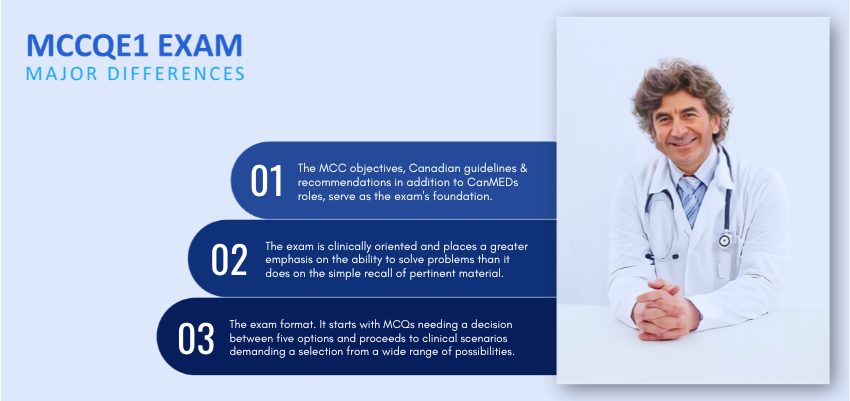
The MCC Objectives’ Roles in MCCQE1:
The MCC objectives are the core of all multiple-choice questions and clinical cases in the MCCQE1 exam. These guidelines are congruent with CanMEDs role to accurately assess candidates’ proficiency. The CanMEDS roles are organized into five domains: medical knowledge, core clinical skills, patient care, professionalism and communication, and leadership.
The MCC objectives are essential for ensuring that all multiple-choice questions and clinical cases in the MCCQE Part I are clinically relevant. The objectives provide a comprehensive framework for assessing the candidate’s knowledge in each domain and are the foundation of the exam. Knowing and understanding the objectives is key to success on the exam and should be a major focus of any candidate’s preparation. The objectives help to ensure that the exam is a fair and accurate assessment of the candidate’s knowledge and clinical skills.
So, it is essential for candidates to give considerable attention to studying the objectives thoroughly before taking the exam. Doing so will ensure that they are ready and have a solid grasp of the topics that will be assessed and raise the likelihood of passing the exam since objectives are an integral part of the exam and should not be overlooked when studying for the exam.
Format of the MCCQE1 Exam:
The exam is a comprehensive board exam administered by the Medical Council of Canada and is designed to determine the eligibility of candidates for medical licensure in Canada. For those who are preparing for an upcoming exam, it is important to become familiar with its format and components. Understanding the types of questions that will be asked and the strategies for responding to them will help ensure that you are well-prepared and can manage your time effectively. By becoming familiar with the format and components of the exam, you will be better prepared to tackle the questions and maximize your performance.
Moreover, understanding the scoring system in both parts of the exam helps candidates do better since it allows them to modify their priorities throughout the exam depending on their test-taking strategies and score higher.
MCCQE1 Scoring System:
It is no secret that the exam is designed to test the knowledge and skills of those taking it. To ensure that the most qualified candidates are chosen, exams are set up to reward accuracy and speed of comprehension. Those who are able to answer the questions correctly and in the allotted time will be rewarded with a higher score.
This encourages candidates to not only understand the material but also to be able to answer the questions quickly and accurately. This system ensures that the most qualified candidates are chosen and that those who have the most knowledge and skill are rewarded.
The scoring system for multiple-choice questions is an important factor in determining a candidate’s success. It is based on the number of questions answered correctly, and those who answer more questions correctly will receive a higher score.
The Clinical Decision Making (CDM) part of the medical licensing exam is an important component of the overall assessment. This part of the exam is scored based on the number of clinical cases answered correctly. Those who answer more clinical cases correctly will receive a higher score. However, the CDM part of the exam has critical options among the answers and instructions to follow. The candidate will receive a zero score if they choose the option that harms the patient or a lower score if they do not follow the instruction. Therefore, it is vital to pay close attention to the instructions and options provided in order to ensure a successful outcome.
The bottom line is that the scoring system is designed to reward those who demonstrate a thorough knowledge of the MCC objectives and can answer the questions accurately in the allotted time, as they will gain a higher score than those who take more time and leave unanswered questions behind.
What Makes the MCCQE Part I Difficult?
The MCCQE Part 1 exam is not a difficult one per se, but it does need a thorough comprehension of the objectives as well as test-taking skills, which is why it is one of the world’s most prestigious medical board examinations. The format of the exam is designed to test the candidate’s ability to accurately and effectively address real-life medical scenarios in a safe and secure environment.
The exam is a unique exam that tests medical graduates problem-solving and decision-making skills. Unlike other qualification exams, it does not focus merely on recall and diagnosis but rather on the ability to apply the knowledge acquired during medical education and training in a clinical setting.
The MCCQE1 exam takes a clinical approach to the evaluation of medical knowledge and skills. It is designed to simulate real-life scenarios and accurately assess a candidate’s understanding of the MCC objectives and their ability to use this knowledge in a real-world setting based on the responses they provide to the questions and clinical cases.
This makes the exam challenging, fair, and balanced qualification exam but not difficult. However, many knowledgeable candidates successfully pass the exam; there are medical graduates who make a mistake that makes the MCCQE1 exceedingly tough for themselves.
3 Factors Making MCCQE1 Preparation More Challenging:
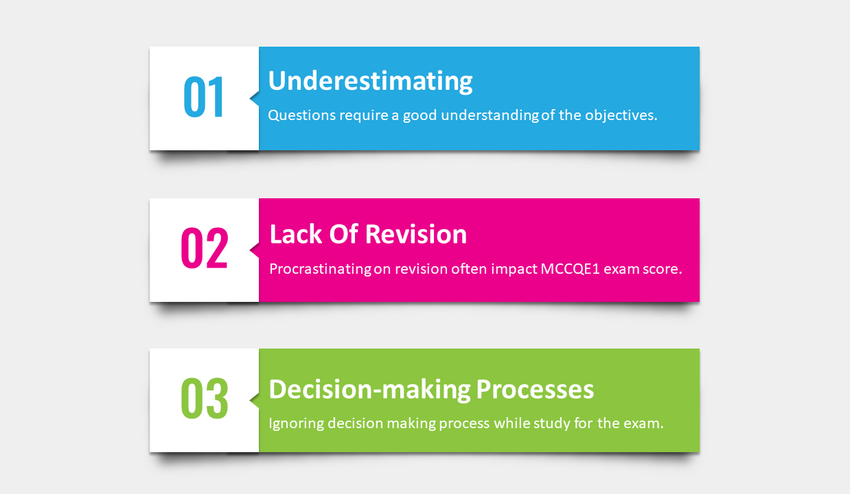
The MCCQE1 exam is a clinically oriented exam designed to assess a medical graduate’s ability to apply Canadian guidelines and recommendations in diagnosing, managing, and treating patients.
To succeed in the exam, it is essential to have a thorough understanding of the diagnostic criteria, management steps and therapeutic options outlined in the Canadian guidelines and recommendations. It is also important to be familiar with the clinical practice guidelines and the evidence-based medicine required to make sound decisions in managing patients.
On the flip side, studying for an exam can be daunting, especially when the stakes are high. However, it is possible to pass the exam with the right mindset and a well-thought-out study plan. It is important to remember that mistakes while studying for an exam can be costly, especially in a computerized exam where the passing criteria are pre-defined.
Even if you put in the time and effort to study, making a mistake can easily turn the table and dramatically reduce the odds of passing the exam. Let’s go through and discuss some of the most common mistakes people make during the MCCQE1 exam preparation:
1. Lack of revision of the material:
Forgetting details when studying for an exam is a normal occurrence. However, without frequently reviewing the material, some can find themselves re-reading the material, which can be incredibly time-consuming and can lead to distress. Regularly reviewing material will ensure details are retained and the material is truly understood. Avoiding re-reading material can help save time in covering more objectives, which can end up being beneficial in the long run.
Regularly revising studied material is also an effective approach to maximizing learning. It can help one find connections between objectives, enhance recall, and significantly reduce the amount of time needed to answer a question on exam day. This can be a valuable way to improve time management and increase efficiency.
Revision is the golden key, particularly when it comes to preparing for the exam. It will help the candidate to cover the MCC objective more effectively.
2. The complexity of the questions:
Critical thinking and problem-solving are essential skills for healthcare professionals, as they are necessary for making informed decisions that are in the best interest of their patients.
Nowadays, the ability to think critically and solve problems is becoming increasingly important in the healthcare sector, as healthcare professionals are asked to make complex decisions promptly.
Exam questions are designed to test your problem-solving and critical-thinking skills. This is a vital factor to consider when preparing for the exam, as this requires candidates to interpret and analyze clinical data and draw conclusions from the presented clinical vignette.
On the flip side, the question stem for the questions might have fewer clinical clues than expected, so applicants must be able to think outside the box and identify relevant information that can help them make the correct decisions in the allotted time. It is important to note that the questions are not designed to be difficult but to measure the candidate’s abilities accurately.
3. The decision-making processes:
The healthcare system is patient-centred in Canada, and exam questions are designed to reflect this by providing multiple options in order to assess a candidate’s understanding of this concept and evidence-based healthcare practice.
Moreover, when it comes to providing the best possible care for a patient, it is essential for the practitioner to understand the potential risks and benefits of the different therapeutic options available. Knowing the risks and benefits of the different therapeutic options can help the practitioner determine which is most suitable for the patient, help the patient make an informed decision and ensure that the treatment is as effective as possible.
This means that candidates should strive to increase their knowledge of various approaches in management and different therapeutic options to correctly answer exam questions.
Ace QBank has included hundreds of summary tables and flow charts to help with the decision-making process, facilitate preparation, and help you conquer the MCCQE1 exam and take the next step toward becoming a certified medical professional.
What Are The Factors Making Passing the MCCQE1 Difficult?
What Are The Factors Making Passing the MCCQE1 Difficult?
The MCCQE1 is known to be a challenging exam, and preparing for it can be daunting. It is essential to know of the common mistakes that can make the preparation process even more challenging. Below, we have discussed these mistakes.
Nevertheless, there are certain factors that can make this task more difficult and possibly increase the chances of failure. Exam failure can be a daunting prospect, especially when it comes to the MCCQE1 exam. It’s an incredibly important milestone in any medical student’s career, and the stakes are high.
The best part is that these factors are often avoidable and can be managed. Here are the factors that potentially lead to a greater likelihood of failure:
- Ignoring the MCC objectives
- Rely completely on non-Canadian resources
- Not preparing well for the exam
- lack of test-taking skills and strategy
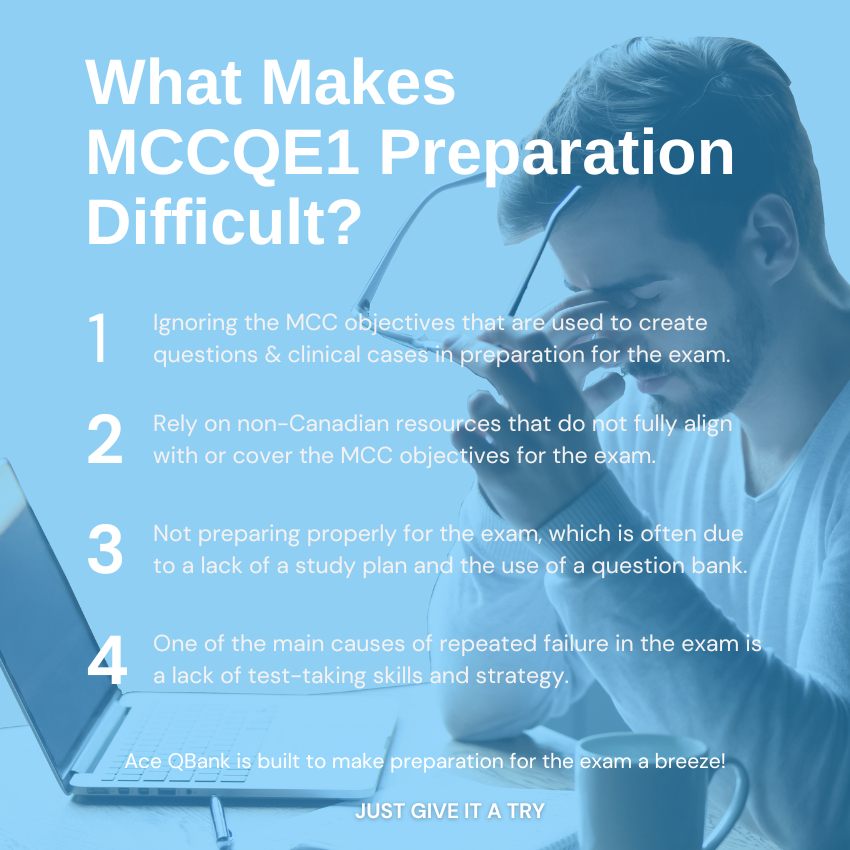
When it comes to passing the exam, many people don’t realize that there can be a multitude of reasons why they may not pass it on the first try. Let’s take a better look at each of these common causes that make passing the exam difficult.
Ignoring the MCC Objectives:
The first common cause is ignoring the MCC objectives when preparing for the exam. The objectives are essential; they are the basis for constructing all exam questions and clinical cases. Consequently, it is essential to spend time studying and understanding the objectives.
This often happens when candidates try to prepare for two qualification exams simultaneously. Using the same resources to prepare for both exams can be tempting, but this is not always the best approach. Using the same resources that were used to prepare for the USMLE Steps to prepare for the MCCQE1 exam, for example, will only provide partial coverage of the MCC objectives. This means some topics may be left out, leaving the candidate disadvantaged.
Any questions or clinical cases they haven’t learned about yet can be difficult to answer and throw off their time management. If they spend too much time trying to figure out the correct answer, they may miss a few questions or become so overwhelmed that they lose control and end up failing the entire exam.
Being aware of the difference and using proper resources for each exam to ensure that all topics are covered will give the candidate the best chance of success in both exams.
Rely Completely on Non-Canadian Resources:
The second factor is relying only on foreign question banks for the exam. While these resources can be helpful, they must be used judiciously. It is critical to recognize that just because two countries are neighbours does not mean that their healthcare systems are identical. The Canadian healthcare system is unique and has its own standards, processes and regulations.
There might be a tremendous amount of resemblance, but there are many differences and guess what? Those differences end up showing up in the exam as question designers are Canadian registered physicians. As such, medical graduates preparing for the exam must utilize the Canadian question bank that is designed based on the MCC objectives and preparation material that has covered the objectives and supplement these resources with Canadian resources to have a well-rounded preparation.
The question banks for healthcare qualification exams are designed to incorporate the objectives, priorities, and challenges that currently exist in healthcare. This is to ensure that the candidates are well-prepared for the exam and for their future careers.
Although practical medicine is somewhat similar around the world, the theoretical approach to medicine varies from place to place. This is why it is essential to have question banks tailored to the specific needs of the healthcare industry in the country where the candidate plans to practice medicine. By doing this, the candidates can gain a better understanding of the theoretical aspects of medicine and be better prepared for the qualification exam.
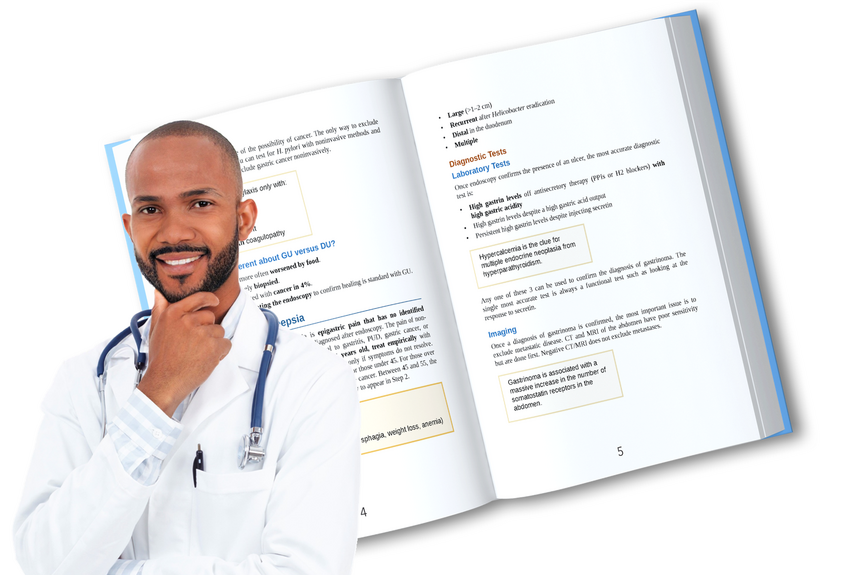
Not Preparing Well For The Exam:
The third factor is not studying enough for the exam. The MCCQE1 covers a wide range of topics from various medical disciplines, including internal medicine, obstetrics and gynecology, emergency medicine, pediatrics, medical ethics, and preventive medicine. This requires applicants to have a deep understanding of the material and the ability to draw connections between different MCC objectives.
Many candidates underestimate the time and effort required to adequately prepare for the exam, resulting in failure. It is essential to dedicate enough time to preparing for the exam, as the material is complex and the exam is highly competitive.
Give yourself sufficient time to digest the material and become comfortable with the test format. This can be accomplished by using a question bank, reading textbooks, and completing practice tests in different study modes.
Setting aside time to review key topics and develop test-taking strategies is also beneficial. Furthermore, creating a study timeline that works for you and provides enough time for review is important, too. Taking the initiative to thoroughly prepare for the exam is essential for success.
Lack of Test-Taking Skills and Strategy:
The fourth factor is a lack of test-taking strategy and time management. Candidates must be able to identify what is being asked in the question stem of MCQ and when they should move on to the next question. Having the ability to manage time and strategize accordingly is essential for test-takers to perform well on the exam. This knowledge can only come from practice and developing a familiarity with the types of questions that are asked on the exam.
Time management and test-taking strategy are essential components of success in any exam. Without them, candidates may find themselves in a difficult situation, unable to get through all of the questions in a timely manner. This is why it is important to develop a plan for how to approach the exam and how to manage your time effectively. It is also important to practice the strategies you plan to use during the exam.
For any candidate taking the MCCQE1 exam, the best way to prepare is to spend adequate time practicing and studying the material. This will help familiarize the candidate with the material and allow them to become comfortable with the types of questions they may be asked. Additionally, it is important to develop a test-taking strategy that works for the individual. A good test-taking strategy and a commitment to practice those strategies can ensure they are well-prepared for the exam and can maximize their scores.
How to start preparing for the MCCQE1 exam?
The MCCQE1 is one of the most important and challenging qualification exams for medical graduates. Passing the exam is a critical step in the journey to becoming a licensed physician in Canada, and as such, it is important to begin preparing for the exam as early as possible.
Some feel overwhelmed by the sheer number of objectives and the material they need to cover when they go through the MCC objectives list, and they end up postponing the preparation for the exam. In reality, most of the objectives are connected, and when the connections are made, the entire list of objectives that seem long shrinks unbelievably.
The best and most effective way to start preparing for the exam is to utilize the question bank specifically designed for the MCCQE1 exam. The sooner you start doing questions and studying, the more time you will have to familiarize yourself with the material, and the better your chances will be of passing the exam.
Ace QBank is the leading Canada question bank and go-to resource for physicians preparing for the MCCQE1. The comprehensive database of high-yiled questions and top-notch clinical cases that are designed based on the MCC objectives, as well as hundreds of summary tables and flow charts along with self-assesssmens for the exam, makes Ace QBank, the perfect question bank to help you succeed on your exams.
Qbank has been a valuable resource for candidates preparing for the exam. We’re proud to have helped many candidates succeed, and we’re constantly working to improve the platform based on feedback from our users. If you’re preparing for the exam, Ace QBank can help you too.

How to properly prepare for the MCCQE Part I?
The best way to properly prepare for the exam is by mastering the MCC objectives. This requires a comprehensive and deep understanding of the objective, as well as a focus on the key topics. The easiest and fastest way to properly cover the MCC objectives is a comprehensive question bank. A good Qbank will allow you to practice different types of questions and gain a better understanding of the material.
Ace QBank is a reliable resource for MCCQE1 preparation, providing quality questions and clinical cases based on the MCC objectives to ensure candidates are well-prepared for the exam. The content is constantly updated to keep up with changes in the medical field, providing candidates with the most accurate and up-to-date materials. It is an ideal choice for those who are looking for a comprehensive and up-to-date solution for MCCQE1 preparation.
When should you take the MCCQE1 exam?
Here’s something you might not have given much thought to. When would be the ideal time to take the MCCQE1 exam? Typically, the candidates choose an exam date based on the wrong criteria. They choose a day off when their spouse is or isn’t working, when traffic isn’t too terrible near the Prometric centre, or when the Prometric centre is quiet.
Those are all the wrong reasons for choosing your exam day. When taking an exam, you must be well-prepared, calm, and collected. The best time to take the exam is when you are well-prepared. Taking the time to study and understand the topics covered in the exam can make a huge difference in your success.
The exam is challenging, and the only way to find out if you are ready for the exam is to ensure you are well-prepared. Fortunately, the MCCQE1 self-assessment can help you with that. It is a comprehensive online assessment tool that can help you evaluate your readiness for the exam. It covers all the topics that are tested on the exam, and it also provides feedback on your performance.
This feedback can help you identify any areas where you need to improve, so you can focus your study efforts on those topics. The self-assessment can help you get there and is a valuable tool for anyone looking to take the MCCQE1.

Does the MCCQE1 Score Matter?
A high score is quite an achievement in board exams, particularly the MCCQE1 exam. However, some people wonder if it is significant for getting a residency interview. Does the high score reflect the application process for residency?
While the MCCQE1 score may not be as important from the MCC’s perspective and may not be the sole determining factor for residency positions, it is still an important consideration for program directors. The candidate’s years of clinical experience, volunteer activities, and scientific publications are all taken into account, but the MCCQE Part I score is still a deciding factor at the end of the day.
The score reveals the candidate’s knowledge and understanding of the objectives and their ability to apply that knowledge in a clinical setting. It also shows a candidate’s ability to communicate effectively with patients and other healthcare professionals. A good score on the MCCQE1 can demonstrate to residency programs that a candidate is well-prepared and capable of succeeding in a medical residency program.
On the other hand, As a physician, you know that the human body is always telling the truth. The exam score reveals the level of true enthusiasm. Enthusiastic persons are often passionate, hardworking, and creative individuals who care about their passion. They are willing to dedicate a great amount of time to their passion because it’s what they love to do – NOT SOMETHING THEY HAVE TO DO.
Program directors are physicians, and they want candidates in a training program who are enthusiastic and dedicated, and they know that those qualities are more likely to be found in candidates with high rather than low MCCQE1 scores.
With enthusiastic candidates, they won’t have to worry about dedication, precision, or explaining why being on time and participating in morning rounds is a good idea! So even though the score may not mean much anymore, it is still shadowing the residency interview process.
It is substantially important for applicants to take the exam seriously and strive to achieve the best score possible.
How Many Attempts Do I Get Before Failing MCCQE1?
The MCCQE Part I can be taken a maximum of four times, with a one-year waiting period after the third attempt before re-applying for the exam. This waiting period allows candidates to review their performance and further develop their skills and knowledge before attempting the exam again.
However, focusing on the number of attempts when it comes to preparing for the MCCQE1 is a mistake. This approach is not conducive to success, as it can lead to stress and anxiety when attempting to pass the exam.
It is better to focus primarily on the content of the exam and on developing the skills and strategies necessary to demonstrate that knowledge rather than worrying about the attempts. A positive and productive mindset will reduce exam stress and help prepare better for the exam. Taking the time to understand the material, create a study plan, and practice test-taking strategies can help individuals to be better prepared for the exam and increase their chances of success.
See it as a once-in-a-lifetime chance to demonstrate your knowledge and skills. Taking this perspective can help motivate you to prepare for the exam. After all, this is your opportunity to show off all the hard work you have put in and the knowledge you have acquired.
Taking the time to properly prepare for the exam will help ensure that you are able to make the most of this opportunity. This could involve studying, reviewing notes, or even practicing questions at the question bank. No matter what approach you take, the important thing is to ensure that you are ready for the exam.
Doing so will help you to feel confident and ready to demonstrate your knowledge and skills.

Which MCCQE1 Question Bank Is The Best?
The Ace QBank is the best question bank currently available for those preparing for the Medical Council of Canada exam. All the questions and clinical cases have been designed based on the objectives of the Medical Council of Canada, making it the perfect resource for anyone looking to ace the exam.
The Ace QBank has been specifically tailored to facilitate preparation for the exam, including evidence-based medicine in questions and clinical cases and constantly updates the content to make sure that the content is always up-to-date and accurate.
The Ace QBank is the ultimate resource for medical graduates preparing for the MCCQE Part 1 exam. It offers a comprehensive range of features that make it unique. With summary points at the end of each question, medical graduates can quickly identify the key point and understand complex medical concepts. Additionally, the Ace QBank provides hundreds of summary tables and flow charts to make the material easier to digest and many custom illustrations to help with recall on exam day. All of these features work together to make the Ace QBank the best resource for candidates studying for the MCCQE1 exam.
The Ace QBank is an invaluable resource for those preparing for the MCCQE1 exam. It offers self-assessments designed to simulate the actual exam, allowing candidates to become familiar with the exam environment. The assessments provide detailed explanations for each question, so candidates can identify the areas they need to focus on to strengthen their knowledge and improve their chances of success.
With Ace QBank, candidates can hone their skills and gain the confidence they need to ace the MCCQE1 exam.
What Does Ace Qbank Offer For MCCQE1 Exam Preparation?
Ace QBank is the perfect solution for those preparing for the MCCQE Part I exam. It offers high-yield questions, top-notch clinical cases, and self-assessment tools that are designed to help candidates build their knowledge and boost their performance. All the questions and cases are based on the MCC objectives, ensuring that candidates get the most relevant and up-to-date information to help them succeed.
The high-yield questions provide an efficient way to review the material and focus on the key concepts. They are designed to help candidates quickly identify the MCC objective they need to focus on, and the explanations are written in a way that is easy to understand.
The clinical cases provide an immersive experience that allows candidates to practice applying their knowledge to real-world scenarios. The cases are presented in a step-by-step format, and the detailed explanations provide a comprehensive understanding of the topics.
Finally, the self-assessment tools are designed to help candidates evaluate their progress and identify areas of improvement.
Let’s go through each product in detail and discuss the major characteristics and advantages of each so that you can understand what this question bank offers.
Question bank
Ace Question Bank provides a comprehensive solution to preparing for the Medical Council of Canada Qualifying Examination (MCCQE) Part I. It allows medical graduates to effectively and efficiently prepare for the exam with 2400 high-yield questions that are designed based on the MCC objectives and offered in two distinct study modes to suit different learning styles and help candidates get the most out of their study time.
Time mode allows you to practice answering questions within a set time limit. This helps you to become familiar with the pace of the exam and develop your test-taking skills.
Tutor mode, which provides detailed explanations for each question, helping you understand the material and develop a deeper understanding of the topics. Together, these two modes provide a comprehensive and effective solution for students to prepare for the exam.
Additionally, there is a summary point at the end of each question to help medical graduates quickly identify the key point and understand complex medical topics. The question bank also includes hundreds of summary tables and flow charts to make the material easier to digest. To further help recall on exam day, the Qbank includes many custom illustrations.
Ace Question Bank is the perfect solution for candidates looking to get the most out of their MCCQE Part I preparation.
Clinical cases
Qbank provides 140 top-notch clinical cases that are designed to help candidates properly prepare for the exam. These cases are based on the MCC objectives with thorough explanations and simulate the Clinical Decision Making (CDM) part of the exam.
For those preparing for the MCCQE1 exam, the best approach for maximizing the clinical cases and getting ready for the CDM part of the exam is to finish the CDM cases after completing the question bank. This is because the question bank contains summary tables and flow charts designed to help with the diagnostic criteria and provide a comprehensive overview of the management steps that need to be taken.
A thorough understanding of diagnostic criteria and management steps from the question bank is essential to address the clinical cases in the CDM part properly. This background knowledge allows candidates to answer pertinent questions associated with clinical cases and make the most of the clinical cases.
Self-assessment
Ace QBank is the only question bank in Canada that offers self-assessments for the MCCQE1 exam. Anyone would be keen to check how efficient their preparation is before appearing for the actual exam after months of study.
The best thing about the MCCQE1 self-assessments is that the 120 hand-picked questions are truly challenging, hand-picked by the expert and different from what you have seen and studied in the question bank to measure your preparation for the MCCQE Part I exam effectively.
Self-assessments are true exam simulations designed to make you feel like you are taking a real exam.
Ace QBank is a dynamic one-stop shop; you will notice changes in questions, whether partial or complete, and new questions introduced to the question pool. However, Ace QBank always announces the release of new questions on Ace QBank’s blog and social media.
Ace QBank’s mission is to assist candidates with their MCCQE1 exam preparation; this is why you will notice a blue feedback button with each question, allowing you to contact us. Let us know if there is anything wrong with the questions or if you think they are poorly designed.
An IT technician will forward your message to a group of Canadian physicians who are developing the questions in partnership with Ace QBank. They are keen to improve, so your constructive feedback is welcomed.
Sign up for the Ace QBank demo now to experience the difference.
5 Advantages Of Using Ace QBank For MCCQE1 Preparation:
Ace QBank is the most popular MCCQE Part I preparation resource. The Qbank includes high-quality questions and clinical cases that cover all exam objectives. Questions and clinical cases are designed to be at the same difficulty level as the actual exam, so you can be certain that you are receiving the best preparation possible. You also can monitor your progress and get feedback on your performance to guarantee optimum preparation.
Let’s explore the five advantages of using Ace QBank to prepare for the exam without giving away any spoilers.
1. In-depth explanation:
Candidates often spend countless hours reading textbooks and trying to understand the concepts they need to know for the exam. While this is a necessary part of the process, it can be a time-consuming and not very effective strategy to cover the objectives of the Medical Council of Canada. It is important to remember that textbooks are not the only source of information and that there are other ways to learn the material.
Preparing for the Canadian qualification exam (MCCQE Part 1) can be daunting; however, having the right resources can make the process easier and more efficient. The best approach is to utilize a comprehensive, concise, and in-depth resource to cover the MCC objectives quickly and effectively.
The user-friendly resource, with an accessible platform that has simplified sophisticated medical concepts, explanations and detailed diagrams for better understanding and also contains self-assessment for the exam, which allow you to evaluate your current knowledge and identify any gaps to improve upon.
Is this platform sound familiar to you?
Ace Qbank is a comprehensive learning resource for candidates of all levels. Qbank provides explanations for all answers; explanations are detailed but concise and easy to understand.
Qbank highlighted in bold need-to-know key points in explanations, making them easy to remember. It also went the extra mile to simplify sophisticated medical concepts by adding customized illustrations.
Ace QBank provides an innovative approach to MCCQE1 exam preparation. This unique feature is designed to give any candidate the confidence and knowledge to succeed in the exam. The Qbank is tailored to the exact specifications of the MCCQE1 and includes comprehensive practice questions and answers, as well as detailed explanations and reference materials.
Additionally, the Qbank offers a robust performance tracking system, which allows users to monitor their progress and assess their strengths and weaknesses. This feature helps a candidate to identify and focus on areas of improvement. With its comprehensive and tailored approach, the question bank provides a complete package for optimal exam preparation.
2. Constant updates:
The field of medicine is constantly adapting to new advancements and discoveries in science. Although these new discoveries may not be found in medical textbooks, they are still excellent resources for exam preparation.
As medical professionals grow and learn, new information is continually being assimilated into their practice. This new information is eventually incorporated into medical board exams, ensuring that medical practitioners are up-to-date on the latest developments in their field.
For exam preparation understanding the current state of medicine is a key factor; therefore, it is essential for candidates to stay up to date on the most current research and developments in the field of medicine to be best prepared for their exams.
Ace QBank has implemented two active update systems for its question bank to ensure that the content remains up-to-date and reliable for MCCQE1 exam preparation. The two systems are regularly monitored and updated with the latest Canadian guidelines and recommendations.
The Qbank system has implemented two updates to ensure users have the most up-to-date and accurate questions available. One update system monitors the question pool and eliminates outdated questions that are no longer valid, which further improves the accuracy of the Qbank. Other systems add relevant new questions to the Qbank, keeping it up to date.
The combination of these two systems ensures that the Qbank remains up-to-date and reliable at all times, providing users with only the most current and accurate questions to help them succeed in their exams.
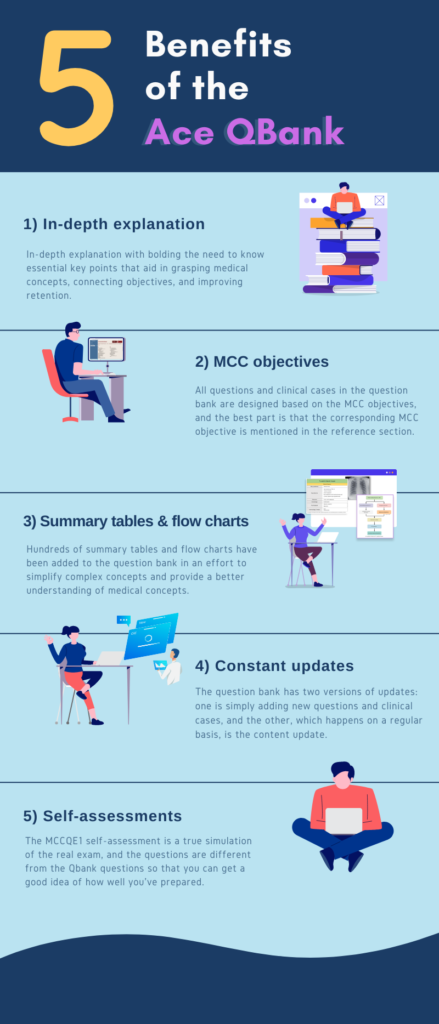
3. Corresponding MCC objectives:
The Medical Council of Canada (MCC) has established objectives to ensure that medical graduates entering practice are competent and safe practitioners. The objectives, which are listed on the MCC website, are intended to help the candidate preparing for the MCCQE Part I exam understand the expectations and standards of the medical profession.
The exam questions and clinical cases are designed based on these objectives that are in line with the CanMEDs roles and the latest Canadian guidelines and recommendations, which is a set of competencies expected of all physicians in Canada.
Ace QBank understands the critical importance of the Medical Council of Canada (MCC) objectives in the MCCQE1 exam preparation. In order to best equip its users for success on the exam, Qbank has crafted its questions in the question bank and clinical cases in the Clinical Decision Making (CDM) part of the question bank based on the MCC objectives. Through this effort, Ace QBank offers users an opportunity to practice exam-style questions and allows users to gain the confidence and skills necessary to excel in the MCCQE1 exam.
4. Summary tables and flow charts:
While preparing for the exam, it is not uncommon to come across difficult diagnostics or management steps that always seem to be forgotten. With the MCCQE1 exam being clinically oriented, it is crucial to remember the exact steps.
Ace QBank provides an extensive range of resources to support the preparation process for the exam. Qbank offers hundreds of summary tables, flow charts, and customized illustrations to help user to study more effectively and retain the knowledge they have obtained while studying. These resources are designed to be engaging and easy to understand so that candidates can recall the material more easily on exam day
Candidates preparing for the exam often have to quickly review a large amount of material. Summary tables, flow charts, and customized illustrations can be used to make this process easier.
Summary tables provide a concise overview of the corresponding objectives, allowing candidates to quickly review the material. Flow charts help candidates to visualize the management steps or diagnostic criteria and connections between concepts, making it easier to remember the material. Customized illustrations are designed to bring the material to life and enhance the recall.
Candidates can save time and effort in their preparation by using summary tables, flow charts, and customized illustrations while also boosting their knowledge and memory, as well as quickly and efficiently reviewing the topics they need to know.
5. MCCQE1 self-assessments:
Preparing for an exam can be a stressful and overwhelming experience, especially when one is uncertain if they are ready. One of the most common dilemmas that candidates face while studying is the question, “am I ready for the exam?”. Before taking the exam, it is essential to evaluate your preparation and address any areas of concern.
Anxiety is a normal feeling for anyone taking an important exam, such as the MCCQE1. It is important to take a self-assessment, or mock test, well before the exam date to give yourself enough time to focus on the areas that need the most attention. This can help to reduce the anxiety you may be feeling.
Taking a self-assessment will help you to identify your strengths and weaknesses and help you to concentrate on the areas that require the most improvement, and give you the confidence you need to perform your best on exam day.
Ace QBank is the only question bank in Canada that offers two self-assessments for the Medical Council of Canada Qualifying Examination (MCCQE1) exam. These assessments are designed to give candidates a true simulation of the exam, allowing them to accurately assess their readiness for the exam.
Self-assessment with distinct sets of questions different from the one seen and practiced within a question bank to accurately evaluate the readiness for the exam and also designed to thoroughly assess a candidate’s understanding of the material, allowing candidates to identify areas of weakness and focus their study efforts accordingly.
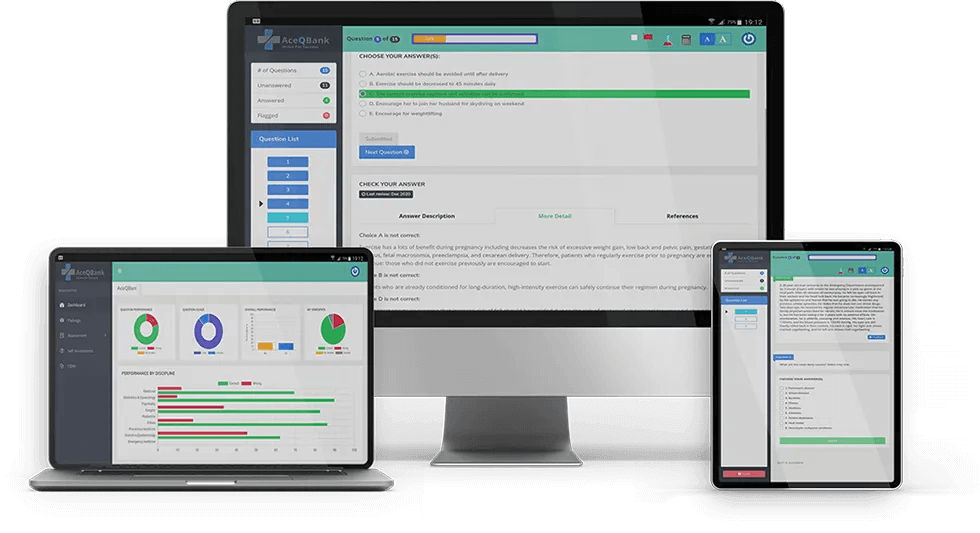
Key Takeaways
To ensure you are prepared for the exam, it is recommended that you start your exam preparation as soon as possible and use resources that cover all of the objectives. This will give you ample time to thoroughly prepare and revise the objectives.
Time management is a critical skill for exam success. It is the golden key to unlocking the best results and ensuring you can answer all the questions you need. Paying close attention to your time management when studying for the MCCQE Part 1 exam is vital. No matter how much knowledge you have, if you do not manage to answer all questions within the allotted time, the remaining questions will automatically receive a zero score.
A good test-taking strategy will give you a competitive advantage and maximize your score. It is crucial to develop a proper test-taking strategy while practicing questions in the question bank. This strategy will help you to answer questions quickly and correctly. You can put strategy to the test in assessments, use the Qbank self-assessment analytics to your advantage, and convert any weaknesses to strengths at least a month before the exam day.
Overall, to have the best chance of success on the exam, it is important to start your preparation early and cover the objectives, pay close attention to your time management, and practice questions to refine your test-taking strategy. By doing so, you can increase your chances of success and make the most of your study time.


